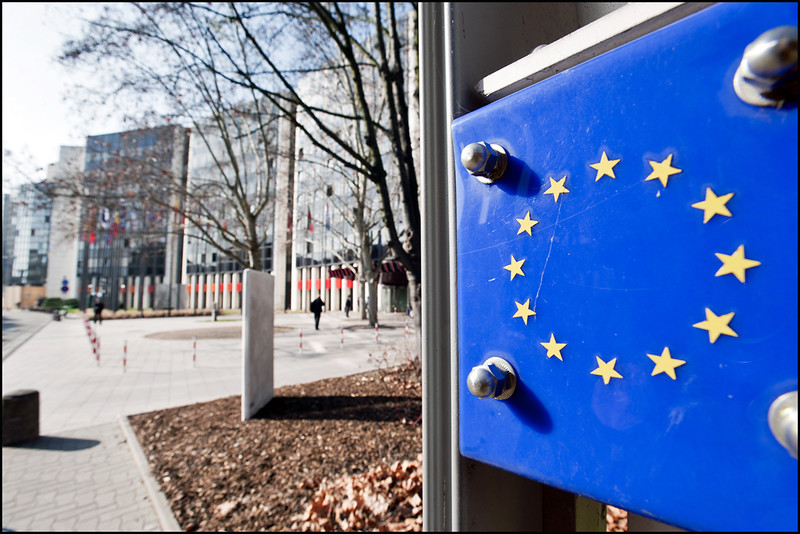Photo: The European Parliament in Strasbourg, France (Flickr)
After a long period of limbo, the war in Ukraine brought a turnaround in European efforts to integrate the Western Balkans into the EU. Bosnia and Herzegovina is the next country to take a step towards EU membership. At the same time, Kosovo is also trying to take such a step, albeit not without a struggle. While these seem like great successes, it is necessary to remain critical. The EU and the accession process remain a story with many twists and turns, constantly pushing the finishing line.
EU grants Bosnia candidate status at turbulent time
After the European Commission recommended candidate membership in October 2022, the time has come. Bosnia and Herzegovina (BiH) was granted candidate membership by EU member states on 13 December. According to Bosnian Foreign Minister Bisera Turković, candidate membership is an important and necessary step for the country. Among other things, the newly acquired status allows BiH to claim new funds and investments, as this step underlines the country's progress. These new prospects offer opportunities for investors, said Turković: "Economically, investors from all over the world will see in Bosnia ... a clear positive side and opportunity for progress."
While candidate membership brings the country closer to EU membership, BiH still has a long way to go until the next stage of the accession process. For instance, the country suffers from major tensions fuelled by ethnic divisions. The last elections in October 2022 put Europe on edge, with escalation feared above all. To date, things remain relatively calm. In 2019, the European Commission had identified 14 key priorities to grant BiH candidate status. However, these have not been adequately addressed due to further fragmentation in society and politics, where nationalist parties are diametrically opposed. Despite this, BiH is still granted candidate status. But if the situation in BiH only seems to be deteriorating, why is the EU granting candidate status just now?
Changed European view of EU accession process
For that, we need to look back at the recommendation of the European Commission, which coincidentally (or not) was given shortly after the Bosnian general elections. This recommendation was mainly a confirmation of the EU's changing view of the accession process. BiH's candidate membership underlines Europe's changed interest in accelerating the Western Balkans' integration process. A process that stagnated under Jean-Claude Juncker. In 2017, Juncker reaffirmed that there is no "fast track" to EU membership. It reinforced his approach of not admitting any countries during his tenure in the European Commission. It was already a source of frustration for countries in the Western Balkans, most of which had been stuck in a slow-track to EU accession since 2003. Northern Macedonia, for example, was only able to open negotiations with the EU last summer, 18 years after it officially applied for EU membership. This is usually the longest part of the EU accession process. Should North Macedonia hypothetically still join the EU in December 2022, it would already be the member state with the longest accession process (Malta and Cyprus took 14 years, respectively).
Under Ursula Von der Leyen, Juncker's successor, there is renewed focus on the EU integration process. This is mainly linked to the development of China as a geopolitical superpower, which is gaining more influence in the Western Balkans through its economic expansion policy, and Russia's recent invasion of Ukraine, increasing Russian influence in nationalist groups and political parties in the Western Balkans. For example, the SNSD of the controversial Milorad Dodik, who was elected president of Republika Srpska in October, is a staunch supporter of Putin's ideology. For the EU, this is damaging because this ideology implies an aversion to "Western thought" and Euroscepticism, further distancing the Western Balkans from Europe. This is why the EU has made it a priority in its enlargement policy to curb the influence of external geopolitical powers.
Partially recognised Kosovo applies for EU membership
In the same week in which Bosnia and Herzegovina was granted candidate membership, Kosovo also made its ambitions to be part of the EU crystal clear. Prime Minister Albin Kurti said at a recent government meeting, "The European Union is a place of peace, security, equality and prosperity and therefore the place of the Republic of Kosovo in this common house is a country that loves peace." On 14 December, the deed was done when Kosovo applied for EU membership. However, Kosovo's accession faces many obstacles, the most important of which is the deteriorating relationship with neighbouring Serbia. The normalisation of relations between the two countries is a rock-solid condition for the future EU accession of both Kosovo and Serbia, but is further away than before due to various disputes.
There are also five current member states that do not recognise Kosovo for various reasons: Romania, Cyprus, Slovakia, Spain and Greece. This also has major implications for Kosovo's accession process. Spain, for the sake of its own renegade regions of Catalonia and the Basque Country, has not recognised Kosovo. Approval of Kosovo's unilateral declaration of independence in 2008 would legitimise the same declaration by these regions. The country is not in favour of Kosovo's accession because, according to Spanish authorities, only European states can belong to the EU. As a result, Spain has blocked several decisions around Kosovo. Partly due to this attitude of some EU countries, an even longer accession process for Kosovo seems to be on the horizon. Not only because some member states lack the political will, but also because the geopolitical influence on Kosovo is limited: China and Russia do not recognise Kosovo either, and EU ally US, on the contrary, has had very close ties with Kosovo for years. Nevertheless, many countries want to accelerate Kosovo's accession, partly to prevent escalation of tensions in the region.
EU benefits from togetherness and decisiveness
For both the EU and the Western Balkans, integration of the entire region into the EU is an absolute necessity. After the break-up of Yugoslavia and the accession of several countries, the idea has always been maintained that the Western Balkans should not become the black box of Europe, sandwiched between member states. That is where the EU must prove its commitment. Not only in the case of Bosnia and Herzegovina, but also in the case of Kosovo. Where normalisation of relations between Kosovo and Serbia is an undeniable step towards accession, the EU itself will also have to unequivocally normalise its relationship with Kosovo, which starts with recognition.
Sources: AlJazeera, BalkanInsight1, BalkanInsight2, BNE, CarnegieEurope1, CarnegieEurope2, CarnegieEurope3, Euractiv, Euronews, EuropeanWesternBalkans, NU.NL, RadioFreeEurope1, RadioFreeEurope2, RFI
Photo: Flickr




